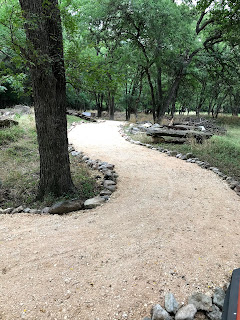
"Stand at the crossroads and look; ask for the ancient paths, ask where the good way is, and walk in it, and you will find rest for your souls." | Jeremiah 6:16
As we have been preparing to make a move into our new friary, one of the big summer projects has been preparing a prayer path, a walking trail that would include places for prayer, meditation, and the stations of the cross. While it is not a seven-mile walk as depicted in the road to Emmaus narrative of Luke, it would still provide enough length to hopefully encounter Jesus. As we continue this project, the expectation is that many people can come to pray, meditate, and find Christ; to encounter Jesus in their longing and yearning, to find clarity and truth in their desire for the Risen Lord.
Everywhere Jesus went, he had met someone who happened to be on the exact same road, waiting for him in the hopes of seeking some kind of newness in their lives. In the Gospel of Luke, there is a story that describes Jesus, James, and John walking on a road, traveling from village to village. During their journey, they encountered a man who sought so badly to follow Jesus. Moved with zeal, this man cried out to Jesus, "I will follow you wherever you go." (Luke 9:57) In this story, Jesus invites them to himself, he invites them to continue wayward on the trail by saying "follow me."
"Walk in the way of love. . . " | Ephesians 5:1
In the Gospel of Luke, two men were walking toward Emmaus and they encountered Jesus without even knowing it was him. Saddened by the news of his death, distraught, spiritually confused and probably questioning everything they had come to believe, these guys went on a seven-mile walk back to Jerusalem so that they could confirm the news of his resurrection. Still, they encountered Jesus on the trail and they felt that their hearts were burning within them; completely filled with a flame of faith that had come from the presence of the risen Lord among them. (Luke 24:32)
In Matthew, when the blind men who were sitting at the roadside begging had heard that Jesus was approaching, together they shouted out to him, "Lord, Son of David, have mercy on us!" They had encountered Jesus on the roadside. We are told that Jesus was moved with compassion and healed them. (Matt 20:30-34) Perhaps these experiences of Jesus on the trail shed light on the reasons why these people were on the trail in the first place. It was a place of conversion, a place for prayer, recollection, and was symbolic of "beginning again."
Scripture is filled with metaphors on the trail because it marked the direction toward spiritual perfection, eternal salvation, justice and righteousness. It was where one found God, while fending off the snares and traps of the enemy. The psalms are rich in this regard, as it says "teach me your ways, Lord so that I may walk in your truth." (Psalm 86:11).
"Direct me in the path of your commands, for there I find delight." | Psalm 119:35
 In all of these accounts, the symbolism of one being on a trail perhaps points us to a personal longing for change and desire to encounter Jesus or to encounter something far greater than what is already known. It marked a journey toward something new, and as we've seen its constantly used as a metaphor for the spiritual journey. This journey begins when we are driven by hope in order to seek the truth. The two on the road to Emmaus, hoped for things to be different, they hoped and wondered about the news of Jesus risen from the dead. They sought the truth. The blind men sought to see, yes, but also to see things differently. They said, "have mercy on us!"
In all of these accounts, the symbolism of one being on a trail perhaps points us to a personal longing for change and desire to encounter Jesus or to encounter something far greater than what is already known. It marked a journey toward something new, and as we've seen its constantly used as a metaphor for the spiritual journey. This journey begins when we are driven by hope in order to seek the truth. The two on the road to Emmaus, hoped for things to be different, they hoped and wondered about the news of Jesus risen from the dead. They sought the truth. The blind men sought to see, yes, but also to see things differently. They said, "have mercy on us!" The beauty too is that as we long to encounter Jesus on our journey, indeed, we will. As we enter onto the trail with the desire to find Jesus, to find the truth, we are also yearning to find clarity, to discover and to begin again with a renewed sense of our identity. We go there to walk and to pray; to be transformed. Jesus asks us the same question that he asked the two blind men, "What do you want me to do for you?" Perhaps the trail is where that question starts to be answered. Like the blind men, we can say to Jesus, "Lord, we want to see!" (Matt 20:32)







